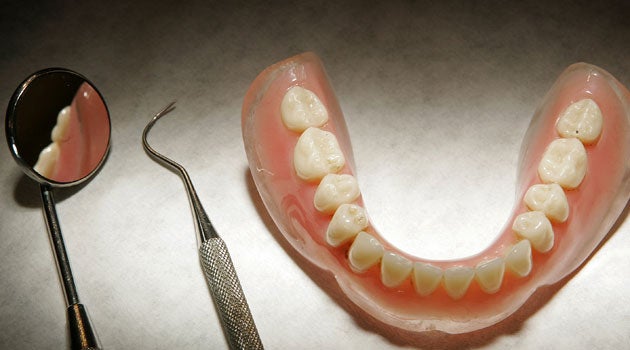
Your support helps us to tell the story
From reproductive rights to climate change to Big Tech, The Independent is on the ground when the story is developing. Whether it's investigating the financials of Elon Musk's pro-Trump PAC or producing our latest documentary, 'The A Word', which shines a light on the American women fighting for reproductive rights, we know how important it is to parse out the facts from the messaging.
At such a critical moment in US history, we need reporters on the ground. Your donation allows us to keep sending journalists to speak to both sides of the story.
The Independent is trusted by Americans across the entire political spectrum. And unlike many other quality news outlets, we choose not to lock Americans out of our reporting and analysis with paywalls. We believe quality journalism should be available to everyone, paid for by those who can afford it.
Your support makes all the difference.What courses? Dentistry; dental surgery; dental hygiene; dental hygiene and therapy; dental technology; oral health sciences; dental nursing;.
What do you come out with? BDS for dentistry and dental surgery, BSc if you do a related course.
Why do it? "Dentistry is a career which offers a wide range of opportunities other than just filling teeth. It is a rapidly changing, expanding profession, which is difficult to gain entry to but provides a lifetime of challenge and interest. The profession is underpinned by science but has a strong artistic and aesthetic component. It is allied to medicine but has good opportunities to deliver work/life balance flexibility. Surgery hours are easier to regulate and workload can be tailored to social and family needs. Dentists are high earners and can regulate their incomes by adjusting their work patterns. There are specialisation opportunities as well as research and teaching careers in universities. Dentists provide an essential health care service. They are respected within communities and work with other health professionals and government officials." - Professor Jonathan Sandy, head of the school of dentistry at Bristol University
What's it about? Basically, it's about keeping people's teeth in good nick. Modern dentistry is a tremendously diverse profession - you can specialise in children's dentistry, orthodontics, complex adult restorative dentistry like crowns and bridges, hospital work - it's up to you. In most courses the first two years are spent in biomedical study, and clinical practice is introduced gradually after that. Dental technology students study the techniques of restorative dentistry, as well as anatomy and physiology. Dundee offers a course in Hygiene Therapy, a mix of dental hygiene and dental therapy.
Study options: The journey to becoming a full-fledged dentist is a long one, starting with a five-year BDS, or four years if you’ve already completed one degree. For dental hygiene and dental technology, you’re looking at a standard three-year course, after which you’re able to complete a BDS.
What will I need to do it? Chemistry is essential, and a second science subject usual, though some schools look for any two strong science subjects. Increasingly, the third subject can be anything you like. It really is one for the brainboxes though, with most institutions only accepting straight-A students for its dentistry degrees.
What are my job prospects? Excellent. You can choose from a range of opportunities within the NHS and in private practice. Dental technicians are in demand in hospital and commercial labs. The average starting salary of over £30,143 is the highest of any subject listed in The Times’ Good University Guide 2012, and experienced dentists can go on to earn well over three times this, so your five expensive years of studying really can pay off. Over 90 per cent of dentistry graduates walk straight into a job.
Where’s best to do it? King’s College topped 2012’s Complete University Guide, followed by Bristol and Manchester, but with every institution listed scoring above 90 per cent overall, you shouldn’t be able to go too wrong wherever you choose. Students at Glasgow, Bristol and Queen’s, Belfast said they were most satisfied with their courses.
Related degrees: Medicine; medical sciences; nursing; biological sciences; health and social care; pharmacy and pharmacology.
Join our commenting forum
Join thought-provoking conversations, follow other Independent readers and see their replies
Comments